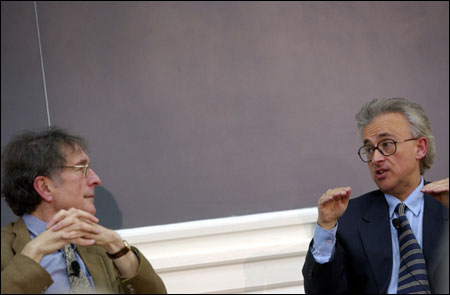GSE conference unites scientists, educators to link mind, brain, education
Neuroscientist Antonio Damasio opens GSE Mind, Brain, Education discussion

Last week (Oct. 7 and 8), Harvard’s Graduate School of Education (GSE) convened an eclectic gathering of biologists, reading specialists, neuroscientists, learning disabilities researchers, geneticists, and child psychologists for a conference looking at the links between the mind, the brain, and education. Called “Usable Knowledge: Mind, Brain, and Education,” the conference of invited participants aimed to create collaborations between scientists and educational researchers to help bridge the gap between brain science research and classroom needs.
Antonio Damasio, head of the Department of Neurology at the University of Iowa Medical Center, opened the conference with a public discussion on Wednesday (Oct. 6) at the GSE’s Askwith Forum. Howard Gardner, Hobbs Professor of Cognition and Education, hosted the conversation, which looked back on the relatively young field of mind-brain studies.
Damasio told Gardner and the filled-to-capacity house that his central line of inquiry is “How is it possible that the brain can create something like the mind?” He described how his medical background expanded, in the 1960s, to include areas like language, memory, and emotions.
“I literally tumbled into the field of emotions,” he said, detailing his work with patients with brain lesions whose emotional capacities, such as reasoning and social behavior, were disturbed when their brain physiology changed.
Damasio, the author of the acclaimed books “Descartes’ Error: Emotion, Reason, and the Human Brain” and “Looking for Spinoza: Joy, Sorrow, and the Feeling Brain” (2003), described the resistance his work initially met when presented to “hard” scientists, who couldn’t imagine the scientific study of emotion.
“That kind of difficulty has been completely overcome,” he said, adding that graduate students and others outside of cognitive science greet his work wondering, “How could it be otherwise?”
The connections between education and traditional cognitive science and neuroscience, while not widely explored, are now seen as natural allies in understanding the same thing.
“You can’t understand the mind without understanding the brain,” said Damasio.
At the two-day Usable Knowledge conference, organized by Bigelow Professor of Education Kurt Fischer and Assistant Professor of Education Tami Katzir, Damasio and Gardner joined scholars from the GSE, Harvard, and beyond for presentations and discussions on how to build reciprocal relationships between educational practice and scientific findings.
Fischer dubbed the conference, with its focus on constructive but not always accordant dialogue, “remarkably successful.” And while he sounds a cautionary note that not enough is known from the fields of neuroscience or genetics to have immediate implications on education, the diverse group of scholars had much to learn from each other.
“The broad consensus was that we need to build education into a research-based practice. Neuroscience and cognitive science can really help us do that effectively,” he said.




